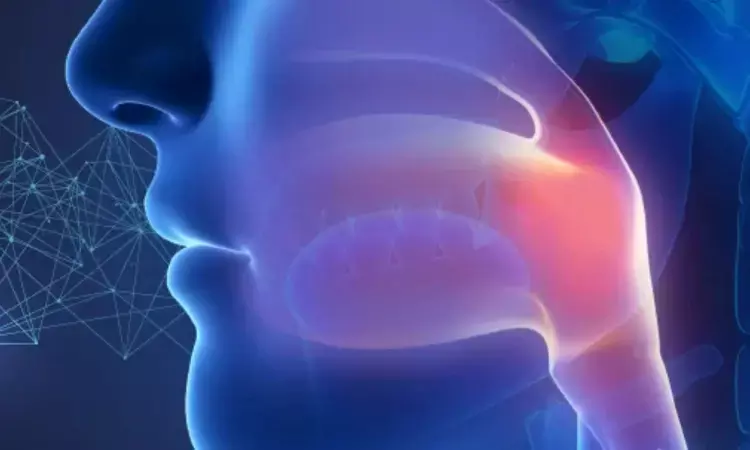- Home
- Medical news & Guidelines
- Anesthesiology
- Cardiology and CTVS
- Critical Care
- Dentistry
- Dermatology
- Diabetes and Endocrinology
- ENT
- Gastroenterology
- Medicine
- Nephrology
- Neurology
- Obstretics-Gynaecology
- Oncology
- Ophthalmology
- Orthopaedics
- Pediatrics-Neonatology
- Psychiatry
- Pulmonology
- Radiology
- Surgery
- Urology
- Laboratory Medicine
- Diet
- Nursing
- Paramedical
- Physiotherapy
- Health news
- Fact Check
- Bone Health Fact Check
- Brain Health Fact Check
- Cancer Related Fact Check
- Child Care Fact Check
- Dental and oral health fact check
- Diabetes and metabolic health fact check
- Diet and Nutrition Fact Check
- Eye and ENT Care Fact Check
- Fitness fact check
- Gut health fact check
- Heart health fact check
- Kidney health fact check
- Medical education fact check
- Men's health fact check
- Respiratory fact check
- Skin and hair care fact check
- Vaccine and Immunization fact check
- Women's health fact check
- AYUSH
- State News
- Andaman and Nicobar Islands
- Andhra Pradesh
- Arunachal Pradesh
- Assam
- Bihar
- Chandigarh
- Chattisgarh
- Dadra and Nagar Haveli
- Daman and Diu
- Delhi
- Goa
- Gujarat
- Haryana
- Himachal Pradesh
- Jammu & Kashmir
- Jharkhand
- Karnataka
- Kerala
- Ladakh
- Lakshadweep
- Madhya Pradesh
- Maharashtra
- Manipur
- Meghalaya
- Mizoram
- Nagaland
- Odisha
- Puducherry
- Punjab
- Rajasthan
- Sikkim
- Tamil Nadu
- Telangana
- Tripura
- Uttar Pradesh
- Uttrakhand
- West Bengal
- Medical Education
- Industry
Novel biomarker derived from EBV promising for mass screening for nasopharyngeal cancer: NEJM

China: A recent study has shown anti-BNLF2b total antibody (P85-Ab) to be a promising novel biomarker for screening of nasopharyngeal carcinoma, with higher specificity, sensitivity, and positive protective value versus the standard two-antibody method. The findings were published online in The New England Journal of Medicine on August 31, 2023.
"Screening with P85-Ab, a novel biomarker derived from Epstein-Barr virus, significantly improved diagnostic performance versus a standard two-antibody test, including specificity (98.3% vs 97.0%), sensitivity (97.9% vs 72.3%), and positive predictive value (PPV; 10.0% vs 4.3%)," the researchers reported. "Combining P85-Ab with the standard biomarkers increased PPV to 44.6%, associated with a 70.2% sensitivity."
The diagnosis of nasopharyngeal carcinoma and survival among affected persons is suggested to be improved by population screening of asymptomatic people with EBV (Epstein–Barr virus) DNA or antibodies. However, even in areas where EBV is endemic, the positive predictive value of current screening strategies is not satisfactory.
Ningshao Xia, the State Key Laboratory of Vaccines for Infectious Diseases, Xiamen University, Xiamen, China, and colleagues designed a peptide library representing highly ranked B-cell epitopes of EBV coding sequences to identify novel serologic biomarkers for nasopharyngeal carcinoma.
Following a retrospective case–control study, validation of the performance of the novel biomarker P85-Ab was done through a large-scale prospective screening program and compared with standard two-antibody–based screening method (EBV nuclear antigen 1 [EBNA1]–IgA and EBV-specific viral capsid antigen [VCA]–IgA).
The study led to the following findings:
- P85-Ab was the most promising biomarker for nasopharyngeal carcinoma screening, with high specificity (99.6%) and sensitivity (94.4%)
- Among the 24,852 eligible participants in the prospective cohort, 47 cases of nasopharyngeal carcinoma (38 at an early stage) were identified.
- P85-Ab showed higher sensitivity than the two-antibody method (97.9% versus 72.3%; ratio, 1.4), higher specificity (98.3% versus 97.0%; ratio, 1.01), and a higher positive predictive value (10.0% versus 4.3%; ratio, 2.3).
- The combination of P85-Ab and the two-antibody method markedly increased the positive predictive value to 44.6%, with a sensitivity of 70.2%.
"In the study, P85-Ab was identified as a novel biomarker for nasopharyngeal carcinoma screening, with improved specificity, sensitivity, and positive predictive value," the researchers team wrote. "The high positive predictive value could improve the acceptance, cost-effectiveness, and capacity, of nasopharyngeal carcinoma screening."
They added, "Combining P85-Ab with other biomarkers could further improve the positive predictive value of nasopharyngeal carcinoma screening and eventually decrease nasopharyngeal carcinoma-associated morbidity."
The researchers noted some limitations of the study. Some cases of nasopharyngeal cancer were diagnosed through linkage to a cancer registry, rather than endoscopic evaluation. Relatively brief follow-up (6 to 18 months) in the prospective cohort. Furthermore, P85-Ab evaluation was done only in Zhongshan, an area having one of the world's highest rates of nasopharyngeal cancer.
Reference:
Li T, Li F, Guo X, Hong C, Yu X, Wu B, Lian S, Song L, Tang J, Wen S, Gao K, Hao M, Cheng W, Su Y, Zhang S, Huang S, Fang M, Wang Y, Ng MH, Chen H, Luo W, Ge S, Zhang J, Xia N, Ji M. Anti-Epstein-Barr Virus BNLF2b for Mass Screening for Nasopharyngeal Cancer. N Engl J Med. 2023 Aug 31;389(9):808-819. doi: 10.1056/NEJMoa2301496. PMID: 37646678.
Dr Kamal Kant Kohli-MBBS, DTCD- a chest specialist with more than 30 years of practice and a flair for writing clinical articles, Dr Kamal Kant Kohli joined Medical Dialogues as a Chief Editor of Medical News. Besides writing articles, as an editor, he proofreads and verifies all the medical content published on Medical Dialogues including those coming from journals, studies,medical conferences,guidelines etc. Email: drkohli@medicaldialogues.in. Contact no. 011-43720751


